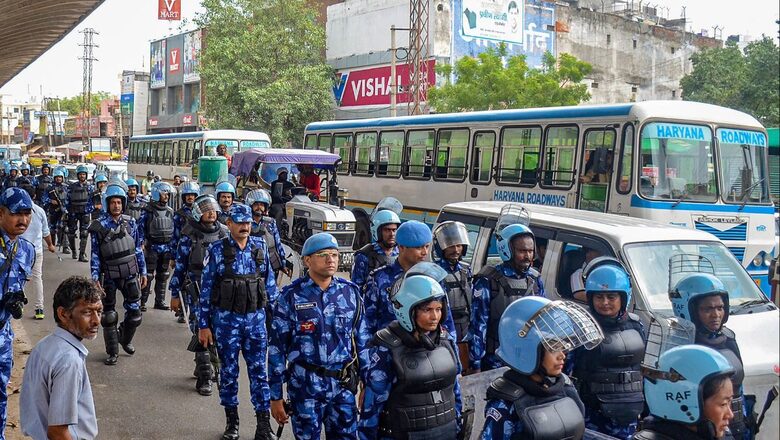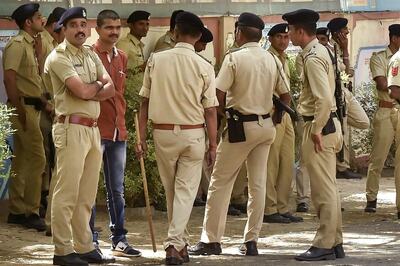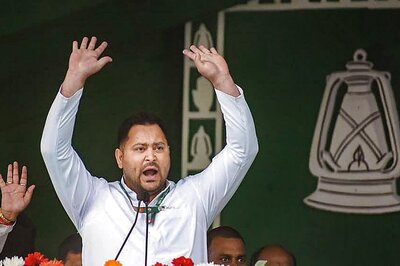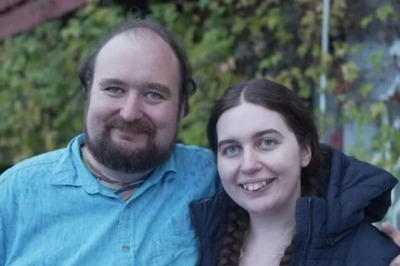
views
Nuh, formerly known as Mewat, is a district nestled in the northern Indian state of Haryana. This region boasts a rich tapestry of cultural diversity, comprising picturesque rural landscapes and charming small towns. Over the centuries, Nuh has been witness to the rise and fall of numerous civilisations, endowing it with historical significance.
However, beneath its idyllic façade, Nuh has gained notoriety as a breeding ground for grave offenses and social inequities. In the years following India’s Independence, there has been a notable surge in the Muslim population’s presence in this region, particularly in some of the tahsils that constitute its core. Notably, in the Mewat district, which was recently carved out from Gurgaon in Haryana, the proportion of Muslims in the populace has experienced a substantial increase, growing from 66.3 percent in 1981 to 79.2 percent in 2011. This demographic transformation has brought forth a range of challenges and complexities, accentuating the need for comprehensive understanding and compassionate dialogue to address the issues of crime and social injustice prevalent in the region.
In the year 2020, Pawan Kumar, a retired district judge and Sessions Judge from Haryana, undertook a thorough investigation into the prevailing situation in Nuh-Mewat. His findings were nothing short of disturbing, drawing chilling parallels to the brutalities of the past. Pawan Kumar likened the atrocities committed against Dalits in Nuh-Mewat to the savagery attributed to the reign of Aurangzeb, a historical figure infamous for his oppressive rule.
The report painted a grim picture of the lives of Dalits in Nuh-Mewat. Barbaric and inhuman acts were described in painful detail, especially the ones targeted at Dalit women. The streets, which should have been safe, turned into scenes of routine molestation and obscene acts in the presence of these women. Tragically, the psychological trauma inflicted on them resulted in many Dalit girls abandoning their education prematurely, fearing for their safety.
Dalit men too bore the brunt of alleged atrocities. A specific incident highlighted the horrifying violence inflicted upon a Dalit youth. In April 2020, Haneef and his accomplices brutally kidnapped a young Dalit man from his home. The assailants subjected him to a merciless beating, leaving him for dead. This incident underscored the rampant lawlessness and the grim reality of life for Dalits in the region.
The situation in Nuh-Mewat took a grim turn on July 31, 2023, as communal strife erupted, enveloping the district and spilling over into the adjacent Gurugram. What commenced as stone-pelting by Muslims on a Hindu religious procession swiftly cascaded into unrestrained riots, with both communities falling into a frenzy.
In the aftermath of this tumult, migrant families found themselves entangled in a web of fear and uncertainty. The looming threat of attacks by troublemakers compelled numerous families to contemplate a hasty departure from the state, seeking solace in their hometowns. The intensity of the upheaval surged, resulting in the conflagration of shops and eateries. Tragically, even a mosque became a target, leading to the heart-wrenching loss of lives, including that of a revered cleric, Maulana Saad.
Amid rising tensions, rumours circulated about the presence of Monu Manesar, a controversial cow vigilante accused of involvement in the deaths of two Muslim men earlier that year. The Haryana Police arrested 116 individuals and lodged around 29 FIRs following communal clashes, prompting curfews in Nuh and Gurugram. Internet services were suspended in Nuh, and schools and colleges closed in Gurugram and Faridabad for public safety. Law enforcement detained over 80 people linked to the clashes as the death toll reached five. A petition reached the Supreme Court to halt rallies by VHP and Bajrang Dal in the Delhi-NCR area post Nuh violence; the court allowed the rallies with video recording. Tragically, the death toll from Haryana communal clashes later rose to six. The state formed a committee to investigate the violence’s underlying causes. VHP and Bajrang Dal staged protests in Delhi and UP cities.
According to an official statement, two home guards, Neeraj and Gursev, who were deployed from Gurugram to Nuh in the wake of the violence, died in the line of duty. Also, a sweetmaker named Shakti Saini was killed along with Bajrang Dal member Abhishek Rajput in the July 31 violence. Another Hindu who fell prey to this barbarity unleashed by the bloodthirsty Islamist mob was a Bajrang Dal activist named Pradeep Kumar.
In recent years, numerous international media outlets have demonstrated a disturbing trend of overt Hinduphobia and a skewed anti-India bias in the content they disseminate on their digital platforms. Whether delving into India’s remarkable advancements in its space programme or navigating its intricate social fabric, forged by a tapestry of diverse cultures, these foreign media sources have repeatedly exhibited an unabashed air of condescension and an insidious inclination to belittle the nation, resorting to baseless allegations. This inclination was yet again glaringly evident during their coverage of the recent spate of violence.
Al Jazeera, a state-funded media entity under the governance of Qatar — an Islamic monarchy that paradoxically proclaims secular sermons to non-Muslim nations — recently published a report that sought to depict Muslims as the primary victims of the unrest that unfolded in Nuh. This report, rather craftily, attempted to place the blame for the violence on their co-religionists, all the while obscuring the genuine circumstances of the events. Likewise, the BBC’s article titled, “Nuh: Mosque set on fire, cleric killed in religious clashes in India’s Haryana,” resonated with the persistent pattern it has established — safeguarding the interests of Islamists and often casting their victims as the aggressors.
Despite the stark reality that Hindus bore the brunt of this unrest, enduring a barrage of aggression from a vehement Islamist force armed with sticks, stones, and even bullets, some foreign media outlets artfully shifted the narrative, unfairly attributing the violence to the Hindu community. Such selective reporting not only skews the truth but also fans the flames of discord.
Amid this backdrop, it is crucial to recognise how the Islamist-Leftist lobby consistently manipulates narratives, further fanning the flames of chaos and confusion. This calculated distortion of facts exacerbates tensions and contributes to the perpetuation of strife, rather than fostering meaningful understanding and resolution. It is imperative for media organisations to prioritise accurate and unbiased reporting, steering away from propagating divisive agendas that only serve to deepen societal divides.
Let us earnestly call for a collective pursuit of peace and tranquillity. The tragic loss of lives and the suffering endured by the people of Nuh-Mewat underscore the urgent need for comprehensive police reforms, strengthened law enforcement, and increased security measures. It is crucial to recognise that underlying societal fault lines and historical grievances may have contributed to the tragic turn of events. Yet, a more pressing issue emerges from the narrative: the apparent failure of the state to pre-emptively ensure security during the rally announcement. This failure underscores the urgent need for a more robust approach to maintaining law and order. It is incumbent upon the state government, led by Chief Minister Manohar Lal Khattar, to take decisive steps to prevent such tragic events in the future and uphold the rights and safety of all citizens.
As we traverse these tumultuous times, a clarion call emerges for unity, peace, and reform. It is essential that the process of police reform is accelerated, enabling them to maintain peace effectively. As we stand at this crossroads, may we rise above divisive narratives, strive for unity, and work tirelessly towards a future where Nuh-Mewat can truly flourish in peace and progress.
Zeba Zoriah writes on politics, policies, culture and women’s rights. Views expressed in the above piece are personal and solely that of the author. They do not necessarily reflect News18’s views.




















Comments
0 comment